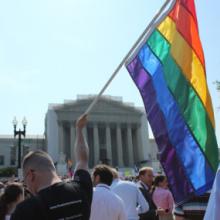Politics
IN THE EARLY evening of Nov. 8, 2013, Arnel Montero convinced his mother, wife, and three children to evacuate to a two-story concrete house above the coastal area of Barangay 70, a fishing village in Tacloban City, on the island of Leyte in Central Philippines. He expected the worst, with the news reporting the arrival of super-typhoon Haiyan the following morning, and thought the house would be a safe place where his family could take shelter while he remained in their shanty by the coast.
Even though Haiyan’s fury hit the islands at speeds surpassing 200 miles per hour, the strong winds alone would not have created such a major tragedy. But Haiyan precipitated a storm surge that led to grave loss of life and massive devastation. Barangay 70 is located near the city’s main pier, and the tidal waters pushed cargo boats toward the coast, smashing shanties and buildings, including the concrete house where Arnel’s family sought shelter. Arnel managed to save himself, but the rest of his family perished.
The National Disaster Risk Reduction and Management Council, as of mid-March 2014, reported 6,268 deaths, although the actual number could be double that. In Barangay 70 alone, there were close to 300 people who died. An estimated 12.2 million Filipinos were affected by the disaster that hit eight provinces in the Visayas islands region; close to 2 million houses were either washed out or partially destroyed.
The national and local government’s response to the massive need for relief operations was slow. Political bickering, incompetent local governments, and the sheer inefficiency of the administration of President Benigno Aquino all contributed to major delays in bringing food, potable water, clothing, medicine, and temporary shelter to the survivors. Weeks after Haiyan struck, interior villages still had not received aid. It was not until early January 2014 that government relief agencies managed to set up the systematic distribution of relief goods.
A Brookings Institution study says that today’s Democrats are less interested in even liberal Christianity, but that it still might be possible to bring back the religious left. I would think this is true. Pope Francis seems to be bringing liberal Catholicism back into power. Many ostensible evangelicals are reconfiguring their teachings to promote liberal, rather than conservative, politics. And of course there are the mainline liberal Protestants who are still around in significant, though reduced, numbers.
Make no mistake: the Gospel is political.
Politics refers to “the affairs of the city” and “influencing other people on a civic or individual level.”
Throughout his life, death, and resurrection, Jesus is political. He influences people to live into the Kingdom of Heaven. For Jesus, Heaven is not essentially some place off in the distance where you go after you die. No, Heaven is a way of life to be lived right here, right now. We see this clearly in the prayer he taught his disciples:
Thy kingdom come, thy will be done on earth as it is in heaven.
When Jesus entered Jerusalem riding a donkey on Palm Sunday, he was performing a political act. But it was a political act unlike any other.
Here’s a crash course to understand what’s happening in Australia with refugees and the politics of Jesus.
Imagine for a moment that in the lead up to the next U.S. elections, a political party changed immigration policies and took the relatively small number of people seeking safety on boats from, let’s say Cuba, and locked these persecuted people up on Guantanamo like criminals — elderly, men, women, and over 1,000 children. You would expect outcry from people across the political spectrum. Indeed there was. Only the fear campaign was so effective, the blame game so seductive and the election win so decisive, that the majority of politicians on all sides sacrificed their principles on the altar of popularity. Not to mention these desperate people — tired, poor, huddled masses yearning to breathe free — … these now homeless who were literally tempest-tossed on boats sacrificed on this bloody idol of false security. Of course behind closed doors, elected officials will confess to you, as a Christian, that they personally find it abhorrent but for the sake of the party and all the good they could do when they get into power they rationalize with the logic of Caiaphas and get the same results: the sacrifice of the innocent.
Sound too far-fetched? This is the recent history of Australia. Thanks, Paul Dyson, for the Cuba analogy.
CAN YOU GO to school to become an interfaith leader? An increasing number of faculty, staff, and students on campuses believe the answer is “yes.”
Interfaith leadership courses are starting to crop up at colleges across the country. At New York University and Nazareth College, you can even get a minor in the area. The organization I lead, Interfaith Youth Core, recently organized a conference for university faculty interested in this area. We expected 30 people to show up, and got nearly 120. This all suggests that this may be a field whose time has come.
Academically speaking, “interfaith leadership” is part of the larger field of “interfaith studies.” Just as you might study education at a university to become a teacher, in the future you will be able to take coursework in interfaith studies in preparation for a career in interfaith leadership.
Interfaith studies looks at the myriad ways that people who orient around religion differently interact with one another and considers the implications of that interaction for everything from personal lives to global politics. It’s a field that asks questions such as: In what religious groups is the intermarriage rate growing fastest, and what are the distinctive dynamics of such relationships? What types of political arrangements seem to foster positive interaction between faith communities, and what types are associated with interreligious tension? How effective are current religious education programs in forming young people in faith traditions?
OUR HISTORY IS increasingly hostage to a deep and broad ecological crisis. Stalking us for centuries, it is now upon us in the interlocking catastrophes of climate destruction, habitat degradation, species extinction, and resource exhaustion. Some call it “peak everything.”
“All we have to do to destroy the planet’s climate and biota and leave a ruined world to our children and grandchildren,” concluded environmental policy analyst James Gustave Speth in The Bridge at the Edge of the World, “is to keep doing exactly what we are doing today ... to release greenhouse gases ... impoverish ecosystems and release toxic chemicals at current rates, and the world in the latter part of this century won’t be fit to live in.”
Our Christian faith and practice now unfold either in light of or in spite of this crisis. Our choice is between discipleship and denial.
Two trends among thoughtful Catholics, evangelicals, and other Protestants in North America over the last quarter century are helping awaken us to “response-ability” in the face of these inconvenient truths. One is the spread of contextual theology, which demands both analysis and engagement with social realities around us. The other is how “creation care” has gained broad traction among churches.
But these trends need to be integrated. Contextual approaches have tended to address social, economic, and political issues apart from ecological ones. And environmental theologies are not contextual enough: often too abstract (debating “new cosmologies”), focused on remote symptoms (tropical rain forests or polar ice caps), or merely cosmetic (“greening” congregations through light bulb changes while avoiding controversies such as the Keystone XL pipeline).
Our “all hands on deck” moment requires a practical approach that challenges and equips our churches to learn how to “serve and preserve” the earth (Genesis 2:15). The best way to do that is to focus on the particular places in which we dwell.
“Christianity” is often used to manipulate, control, shame, judge, and hurt others. It’s influenced by politics, popularity, wealth, success, pride, hate, fear, selfishness, and a desire for power. The poisoning of our beliefs — or theology — happens subtly, under the pretense of tradition, teaching, education, discipline, authority, respect, and religion.
We often treat theology similar to politics, where our beliefs and doctrines are based on which ones benefit us the most.
We strive to get everything we can from our faith, and this can lead to spiritual narcissism, where we become obsessed with maximizing the benefits for ourselves while withholding them from others.
Rarely do we adhere to — or agree with — theological ideas that benefit someone else more than us. Sacrificing our own comforts for the sake of others is absurd — which leads to a sense of divine favoritism.
SINCE THE 2014 election could be the most decisive political moment in a generation, the most important question is: Who will be Hillary's running mate in 2016?
The second big question is: What else does Chris Christie have to do to make other Republican presidential hopefuls slip back into the woodwork? What part of “you want a piece of me?” don’t they understand? Have they no fear of—just to choose something at random—major traffic delays in their districts? Are they currently enjoying their drinking water or other public utilities? Do they like their kneecaps?
A bit harsh, perhaps, especially regarding a man whose political obituary is already being written, and whose Wikipedia entry may one day not start with “45th president of the United States,” but with the phrase “Angry Birds spokesperson.”
But Chris Christie is a survivor. He may be only six Twinkies away from not being governor of New Jersey (assuming that he eats them all in one sitting), but he enjoys a strong approval rating and, at this writing, is still innocent of all accusations against him, including humility. His only real threats for the nomination are Paul Ryan and Jeb Bush, who is currently trying to be adopted by a family with a different last name.
The influence scandal that has roiled Christie’s staff and highlighted his strong negatives happened, after all, in New Jersey. And what happens in New Jersey stays in New Jersey because, for their own protection, witnesses tend to fugetaboutit.
Gay rights are colliding with religious rights in states like Arizona and Kansas as the national debate over gay marriage morphs into a fight over the dividing line between religious liberty and anti-gay discrimination.
More broadly, the fight mirrors the national debate on whether the religious rights of business owners also extend to their for-profit companies. Next month, the U.S. Supreme Court will decide whether companies like Hobby Lobby must provide contraceptive services that their owners consider immoral.
The Arizona bill, which is headed to Gov. Jan Brewer’s desk for her signature, would allow people who object to same-sex marriage to use their religious beliefs as a defense in a discrimination lawsuit.







